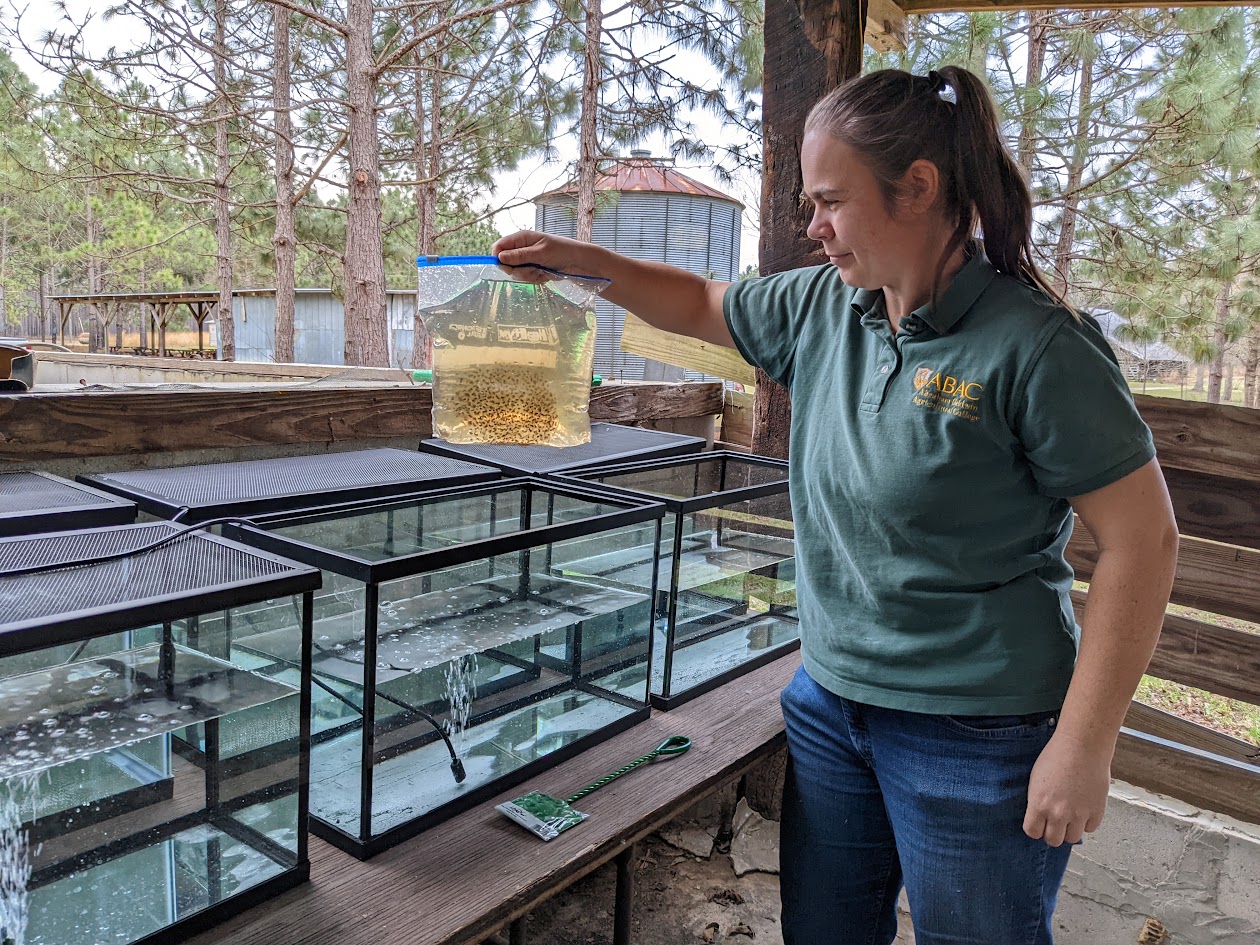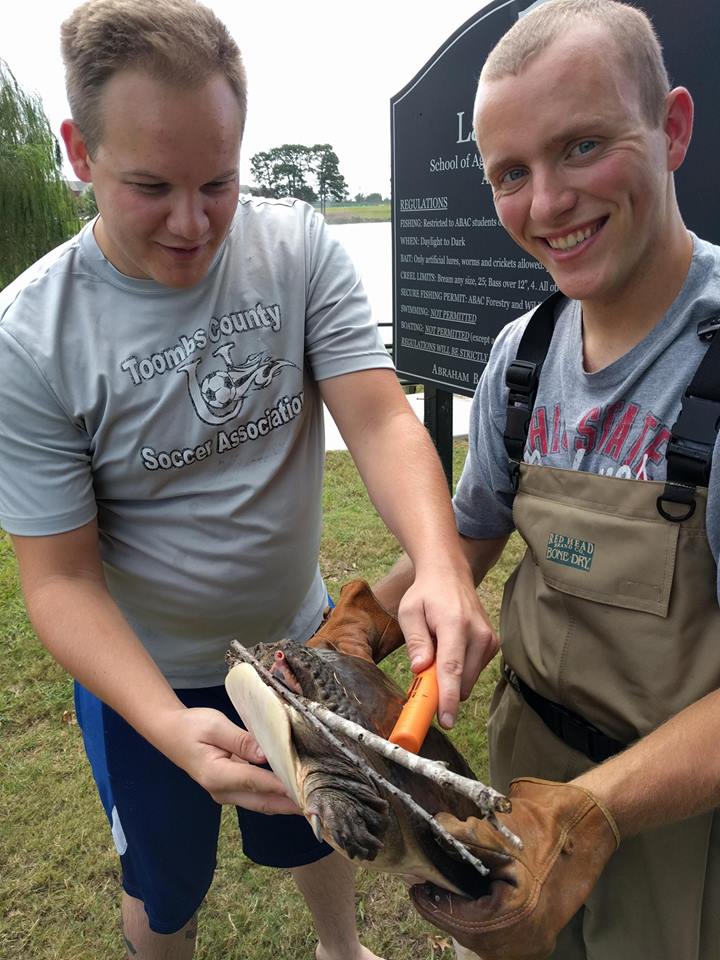Institutional Animal Care and Use Committee (IACUC)

Dr. Vanessa Lane, ABAC wildlife professor, holding a clutch of gopher frog eggs. ABAC has partnered with the Georgia Department of Natural Resources and the Gaskins Forest Education Center to raise rare gopher frogs from eggs to froglets to release in locations where habitat has been restored.
ABAC’s Institutional Animal Care and Use Committee (IACUC) oversees all research conducted on non-human vertebrates. The goals of ABAC’s IACUC are to facilitate undergraduate and faculty/staff research opportunities by ensuring compliance with Public Health Service Policy and Animal Welfare Act regulations and enable research results to be published in peer-reviewed literature where IACUC approval numbers are often required.
All faculty, staff, and students teaching or conducting research on non-human vertebrates must review this page.
About IACUC
The IACUC is appointed by the Provost and Vice President of Academic Affairs (PVPAA) and has broad regulatory and advisory authority with respect to proper care of animals used for research and teaching. The PVPAA also appoints the Chair. The IACUC is charged with developing guidelines that ensure faculty, staff, and students comply with federal and state guidelines and generally accepted best practices concerning the use of animals in research and teaching. The IACUC consists of one faculty member from each of ABAC’s four schools, one internal member at-large (faculty or staff), and two external members at-large, one of whom is a veterinarian.
Definitions of Animal Research
Does your research entail the study of live vertebrates as defined by Public Health Service (PHS) policy or by United States Department of Agriculture Animal Welfare Act (AWA) regulations? Please read this section carefully. The definitions differ and you may not need to apply. If you have any questions please contact Dr. Vanessa Lane, IACUC Chair.
Animal research under Public Health Service Policy is defined as follows: “Research conducted on any live, vertebrate animal used or intended for use in research, research training, experimentation, or biological testing or for related purposes. A study that entails the eggs and embryos of vertebrates are not covered until those eggs hatch. However, the larval forms of fish and amphibians are covered.”
Animal research under the Animal Welfare Act is defined as follows:
“The term ‘animal’ means any live or dead dog, cat, monkey (nonhuman primate mammal), guinea pig, hamster, rabbit, or such other warm-blooded animal, as the Secretary may determine is being used, or is intended for use, for research, testing, experimentation, or exhibition purposes, or as a pet; but such term excludes (1) birds, rats of the genus Rattus, and mice of the genus Mus, bred for use in research, (2) horses not used for research purposes, and (3) other farm animals, such as, but not limited to livestock or poultry, used or intended for use as food or fiber, or livestock or poultry used or intended for use for improving animal nutrition, breeding, management, or production efficiency, or for improving the quality of food or fiber. With respect to a dog, the term means all dogs including those used for hunting, security, or breeding purposes.”

ABAC students Dalton Ridgdill (left), Parker Gerdes (right), and Brittany Ray used a handheld metal detector to determine if turtles had ingested fish hooks as their senior research projects.
Their work was eventually published in a peer-reviewed scientific journal, the Wildlife Society Bulletin, in 2023.
Application and Approval Process
Research applications expire one year from approval and renewal is not automatic; you must resubmit your application as a new document. Teaching applications expire three years from approval. If changes to any protocol must be made (including personnel changes, such as long-term undergraduate research projects), please fill out the Change in Protocol form, available below. Please note that changes to protocol do not extend the expiration date of that protocol.
IACUC will not accept or review applications that will require living laboratory rats and mice to be housed on campus. Please use invertebrate surrogates when and where possible, especially for genetics studies (i.e., Drosophila spp. have been used for decades successfully). If you are using purchased, dead specimens for dissection, no IACUC review is necessary. However, if you are pithing live animals to study living tissues (commonly done with frogs), IACUC review is necessary. Studies that confine vertebrates for longer than 12 hours in captivity may be reviewed but must be thoroughly justified by the researcher and appropriate housing must be ready and available before any vertebrate is purchased or captured. Proof of additional state and/or federal permits will also be requested during IACUC review if relevant.
If you have questions while completing the application, contact Dr. Vanessa Lane, IACUC Chair.
Related Links (downloadable forms)
Contact Information
Dr. Vanessa Lane
Email: vlane@abac.edu
Phone: 229.391.4811
Yow 116
ABAC 8, 2802 Moore Hwy, Tifton, GA 31793
